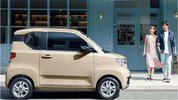- Joined
- 8 June 2008
- Posts
- 13,751
- Reactions
- 20,540
I actually would like the end of this economy BS where youtube stars..influencers . earn millions and people are better off with selfies than actual contribution to societythe crisis we need to have..or we are dead as a society.Who knows, the reset might be that Western currencies are trashed and a new Eastern block digital currency rises from the ashes?
Please let's hope we will have at least Putin left to counter mr Xi..?.i somehow do not have much belief in the Alzheimer one?





